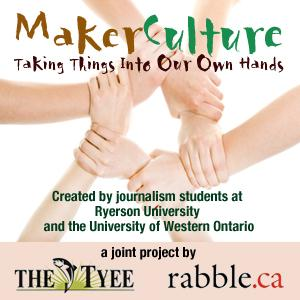A few months ago, I heard from Mark Melnychuk, who represented a group of Canadian journalism students who were in the process of exploring and documenting Maker Culture. Mark asked me what I thought of the Makers, and to be frank, I had to tell him I’d never heard of the movement before. After following some links Mark provided and doing a little digging on my own, I became quite fascinated by this movement. Essentially, these are people who are rejecting things made for them in favor of things they can put together for themselves, whether that is food, clothing, technology, or even science and education.
In their latest installment, the group talks about some of the fascinating projects they’ve encountered, from lattes that represent global warming to jewelry constructed from dried fruit to conducting genetic research on a home computer. The people engaged in maker culture use existing objects and technologies in new and creative ways, putting their own individual stamp on the result.
When Mark originally asked me to respond to Maker Culture from the point of view of a psychologist, my first reaction is that Making might just tap into some evolutionary sense of pleasure at building one’s own cultural artifacts and technology. We do not have any cultures, currently or historically, that did not develop characteristic ways of preparing foods, constructing clothing and shelter, and designing ornaments and tools. Perhaps the universality of these behaviors arises from some hard-wired positive response. We hunt, fish, and tend home gardens when ample food is just down the block at the supermarket. A quick trip to your local hardware store should convince you that people like to do home projects, even if they can afford to pay someone to do it. Gamers build their own from-scratch computers when huge selections of CPUs grace every electronics store.
In addition to the evolutionary reward aspect, it seems to me that Maker Culture also taps into our need to be individual. Anyone can eat at Red Lobster, buy a computer at Best Buy, or a bottle of wine at BevMo. Cultures have become increasingly homogeneous, with Colonel Sanders gracing a street corner in Auckland, New Zealand, and Starbucks in Beijing. Maybe by making something unique for yourself and your loved ones, we recapture that little bit of specialness we call individuality. As I write this, Mr. F is off expressing his individuality by making the ultimate tiramisu. I’m going to have to express my individuality to find a technical solution to sending a very large soundfile off to daughter Karen….What are you going to make?



3 Comments
stephanpapp · February 7, 2010 at 9:14 pm
What if people prefer to make their products from scratch in part because they think they are more competent than the mass producers. I believe that my dad’s homemade food always taste better than store bought, but maybe it doesn’t. In a food-tasting contest, which dish would win- my father’s or the stores? A large part of our satisfaction of a product comes from our expectation that it will be good. When I make curry sauce, I expect it to be good, because I made it and I trust my self. If I were to buy curry sauce, I would expect it to be as good as the aesthetics of its packaging. We like to make our own stuff, because we think we can do it better.
Laura Freberg · February 8, 2010 at 12:28 pm
Good point! I much prefer “home” food to either store-bought or even restaurant food. I also noticed that the apples from our garden are far more flavorful than the ones you buy at the store–not sure what they do to those. Curry is fabulous.
dennislee · March 13, 2010 at 11:57 am
I think the article regarding Maker culture definitely addresses values that we often lose sight of in our modern fast paced lives. There definitely is a sense of satisfaction and reward that arises when you have seemingly created something out of nothing, or made something delicious from scratch. All the steps that go into the project, such as finding the perfect raw materials to the effort put into the each individual procedure, all contribute to a sense of accomplishment when the task is done. I’m definitely not the best cook in the world, but when I was able to cook something that my girlfriend enjoyed, it definitely felt a lot more rewarding than simply going out and paying for dinner.
Comments are closed.